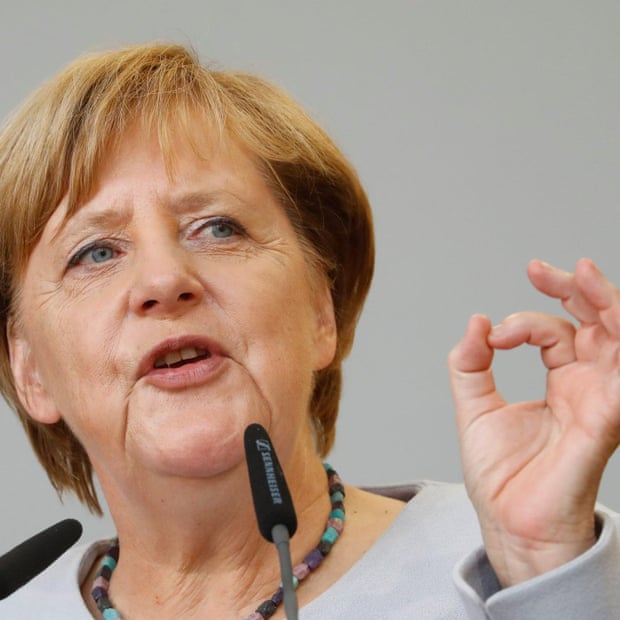Angela Merkel has agreed to cap the number of refugees Germany accepts at 200,000 annually in a concession to her conservative Bavarian allies that has overcome the first hurdle to coalition talks with other parties.
The Christian Social Union (CSU), sister party to the German chancellor’s Christian Democratic Union (CDU), has long pushed for a ceiling on the number of refugees but Merkel had resisted such a position.
In an apparent face-saving measure after 10 hours of talks in Berlin, both parties agreed to not refer to the policy as an “upper limit” or obergrenze, as the CSU had wished, but opted for a softer formulation, stating that “the total number of the intake based on humanitarian reasons … shall not exceed 200,000 a year”.
The parties also agreed the figure could be altered, in line with Merkel’s insistence that Germany must be able to react to international developments. In the case of a new refugee crisis, the government and the Bundestag could revise the figure upwards or reduce it.
Quick GuideHow does the German election system work?
Show

The first vote
Germany’s recently amended electoral system, combining direct and proportional representation, is fiendishly complicated. Its 61.5 million voters get two votes on a single ballot paper: the first for a local representative, the second for a party.
Roughly half the Bundestag’s seats are guaranteed to go to the 299 representatives of the country’s electoral districts, each chosen by their constituents with their Erststimme, or first vote, in a straight first-past-the-post contest.
The second vote
The rest are allocated according to the national vote share won by every party that clears a 5% threshold in the second vote, or Zweitstimme – which is also used to determine the overall number of seats each party winds up with: if a party scores 25% of the national vote, it must get 25% of the seats.
Sometimes parties return more Erststimme representatives than they are entitled to, according to the Zweitstimme. So to compensate, the other parties get extra seats – which means the Bundestag, theoretically made up of 598 representatives, could expand to as many as 800 (it currently has 631).
Who elects the chancellor?
Once a governing coalition has been formed, which can take up to a month, Germany’s president (a largely ceremonial role) nominates the chancellor – usually the leader of the largest party – who is confirmed by parliament in a secret ballot.
The deal between the two conservative parties could allow Merkel to pursue a so-called Jamaica coalition between the CDU/CSU, the Greens and pro-business liberals in the FDP.
Merkel won a fourth term in office in elections last month, but the CDU and CSU secured just 33% between them and lost millions of voters to the far right Alternative für Deutschland (AfD).
The refugee cap deal is widely being interpreted as mainstream conservatives yielding to the demands of voters it has lost to the AfD, largely over Merkel’s open door policy which saw Germany receive almost 1 million refugees and migrants in 2015.
The Green party head, Simone Peters, criticised the deal. “The figure is completely arbitrary, fixed purely ideologically. As far as we’re concerned the fundamental right to asylum applies.”
She said the agreement was “far from the result of exploratory talks for a coalition with the FDP and Greens”.
Experts said they thought the 200,000 target was not an unrealistic one. The numbers arriving in Germany last year fell to about 280,000 and the figure is expected to drop further this year.
The CDU and CSU also agreed to work on creating an immigration law that would make the distinction between asylum seekers and job-seeking migrants, and would give priority to migrants with skills needed to plug a growing shortfall in the labour market. Such a policy has the backing of the FDP and the Greens.
The CSU faces a state election next year. Having dropped 10 points from its share of the vote at this year’s federal election, it is fearful of losing further voters to the AfD. Horst Seehofer, the CSU’s leader, is fighting for his political survival after what is being seen as a miserable election performance.
A coalition deal is still months away, despite Merkel’s insistence she will make it work before Christmas. The longer the delay, the bigger the impact on the economy is likely to be. The alternatives are a minority government or even new elections.
